
The Plains to the mid-Mississippi Valley continue with warm and dry conditions. Any fires that initiate could spread quickly. The warm temperatures will expand across the Southern Plains into the Southwest where numerous records are expected through the weekend. Meanwhile, a cold front will move southward across the northern Plains and Great Lakes region where some snow will develop this weekend. Read More >
Overview
|
A low pressure system that developed in eastern Colorado during the afternoon of April 9th, 2019, produced heavy snowfall across the region on April 10-11th as it moved through the Central and Northern Plains. The initial wave of snow moved into portions of central and eastern South Dakota during the early morning hours of April 10th. This snow fell at rates exceeding 1 inch an hour and produced anywhere from 3 to 12 inches of snow by the evening of April 10th. The heaviest snow occurred between US Highway 12 and 14, stretching from Eagle Butte, eastward through northern Faulk County and to the Watertown area. The second wave of snow occurred as during the evening of April 10th through the early morning hours of April 12th, as the low moved from central Kansas to southwestern Minnesota. Once again, snowfall rates exceeded 1 inch an hour in many locations on April 11th. The heavy snow, combined with winds gusting between 40 and 50 mph, produced blizzard conditions across much of central and eastern South Dakota into the evening hours of April 11th. The poor weather conditions led to "No Travel Advised" across much of the eastern 2/3rds of South Dakota and closed Interstate 90 from Rapid City to Sioux Falls and Interstate 29 from Sioux Falls to Fargo, ND. Storm total snowfall amounts exceeded a foot for numerous locations and some locations even eclipsed the two foot mark. Finally, thundersnow was reported across portions of central and eastern South Dakota, and west central Minnesota especially in the Watertown area. Thunderstorms also produced pea-sized hail across portions of east central South Dakota on the 11th. |
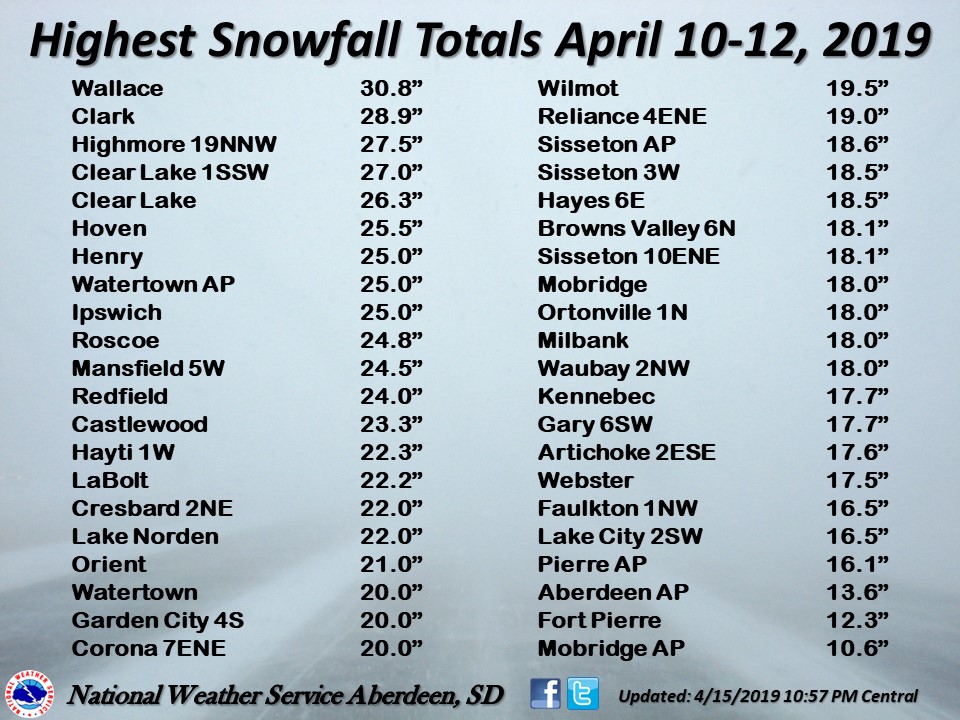 Some of the highest reported snowfall amounts across west central Minnesota and central and northeastern South Dakota. |
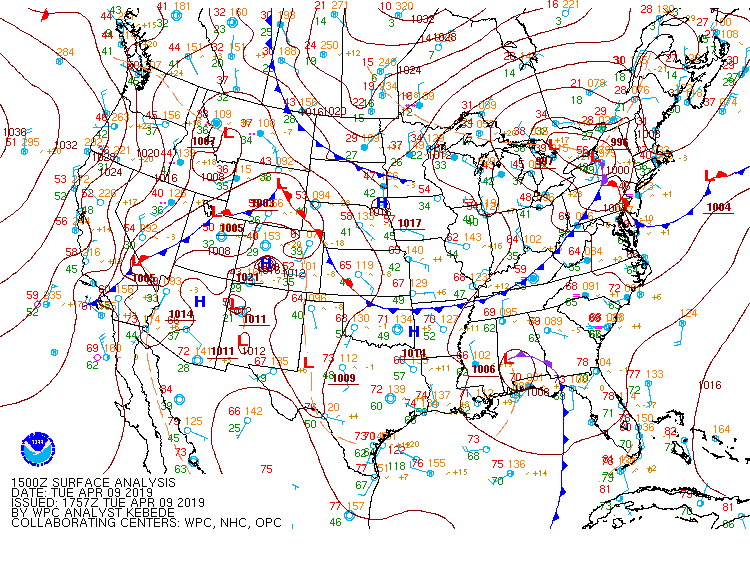 |
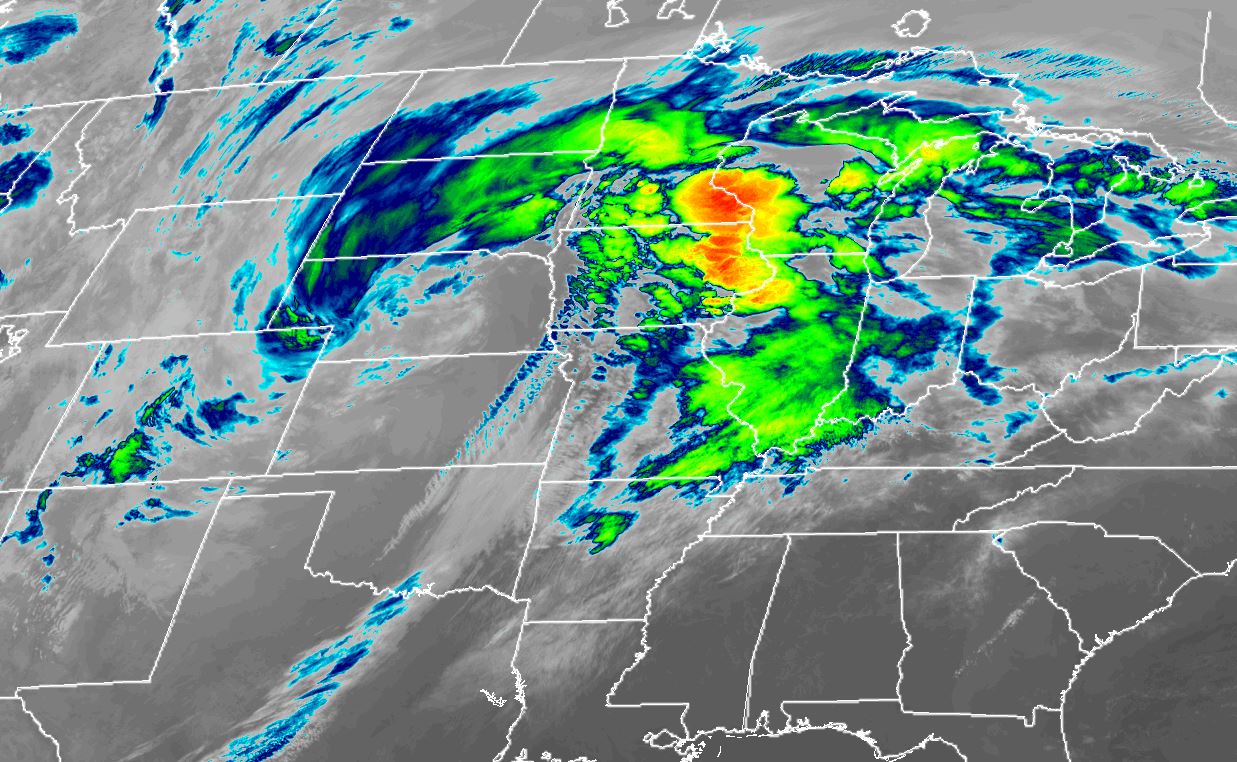 |
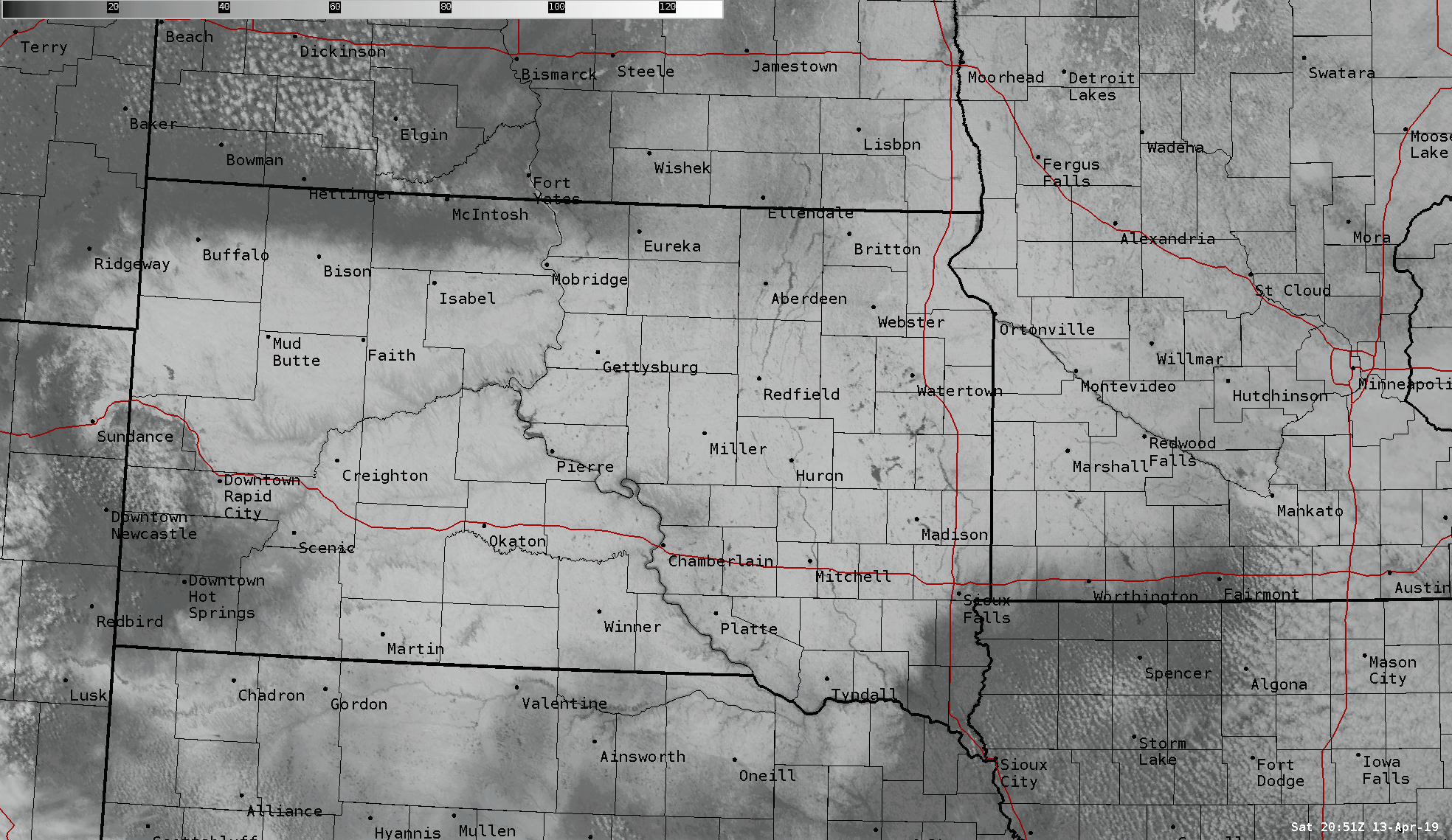 |
|
| Radar loop from 1 PM CDT April 9, 2019 to 10 AM CDT April 12, 2019 | Loop of the surface low track from 10 AM CDT April 9, 2019 to 7 AM CDT April 12, 2019 | GOES-16 Infrared Satellite Imagery at 9am on April 11th, courtesy of the CIRA RAMMB-SLIDER | Visible satellite imagery taken at 4pm on April 13th, showing the extent of the snowfall across the region. |
Wind
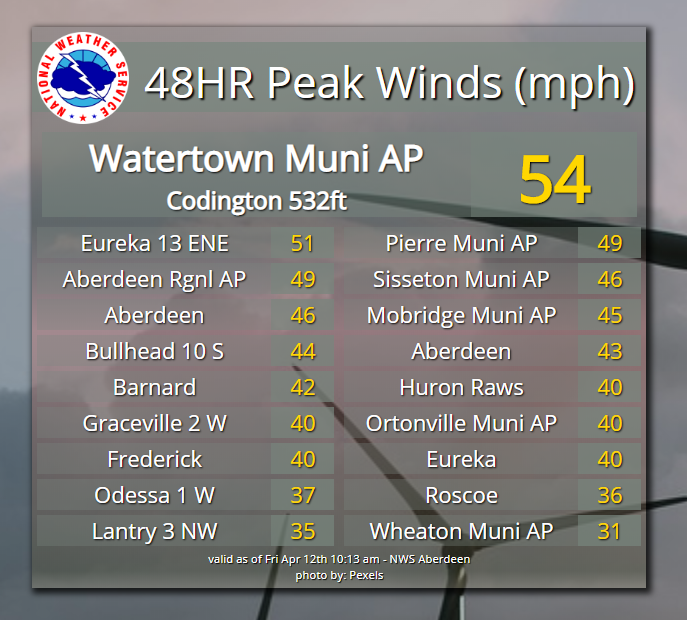
Peak Wind Values
...HIGHEST WIND REPORTS IN THE PAST 48 HOURS... Location Speed Time/Date Lat/Lon Watertown Muni AP 54 MPH 0329 AM 04/11 44.90N/97.15W Eureka 13 ENE 51 MPH 0315 PM 04/11 45.88N/99.41W Aberdeen Rgnl AP 49 MPH 0123 PM 04/11 45.45N/98.42W Pierre Muni AP 49 MPH 0152 PM 04/11 44.38N/100.28W Aberdeen 46 MPH 0400 PM 04/11 45.47N/98.64W Sisseton Muni AP 46 MPH 0101 PM 04/11 45.67N/96.98W Mobridge Muni AP 45 MPH 0322 PM 04/11 45.55N/100.42W Bullhead 10 S 44 MPH 0506 PM 04/11 45.61N/101.06W Aberdeen 43 MPH 1000 AM 04/11 45.54N/98.64W Barnard 42 MPH 0200 PM 04/11 45.72N/98.61W Eureka 40 MPH 0431 PM 04/11 45.77N/99.62W Frederick 40 MPH 0431 PM 04/11 45.78N/98.62W Ortonville Muni AP 40 MPH 0855 AM 04/11 45.30N/96.42W Graceville 2 W 40 MPH 1000 AM 04/11 45.56N/96.49W Huron Raws 40 MPH 0741 PM 04/11 44.24N/98.77W Odessa 1 W 37 MPH 0951 AM 04/11 45.26N/96.34W Eureka 36 MPH 0300 PM 04/11 45.77N/99.62W Roscoe 36 MPH 0700 AM 04/11 45.45N/99.35W Groton 35 MPH 1101 AM 04/11 45.44N/98.09W Lantry 3 NW 35 MPH 0352 PM 04/11 45.06N/101.47W Wheaton Muni AP 31 MPH 1246 PM 04/11 45.78N/96.55W Glad Valley 30 MPH 0216 PM 04/11 45.55N/101.87W Observations are collected from a variety of sources with varying equipment and exposures. We thank all volunteer weather observers for their dedication. Not all data listed are considered official. $$
Snow and Liquid Eqivalent
Snow and Liquid Eqivalent
 |
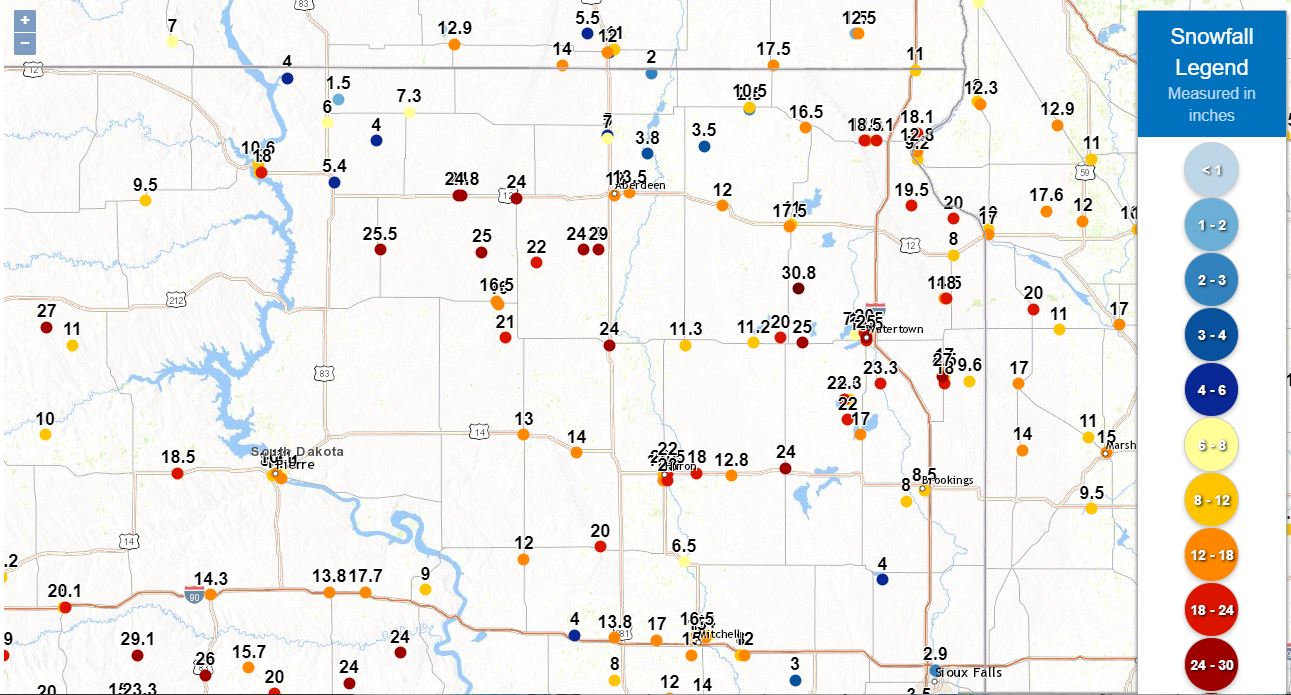 |
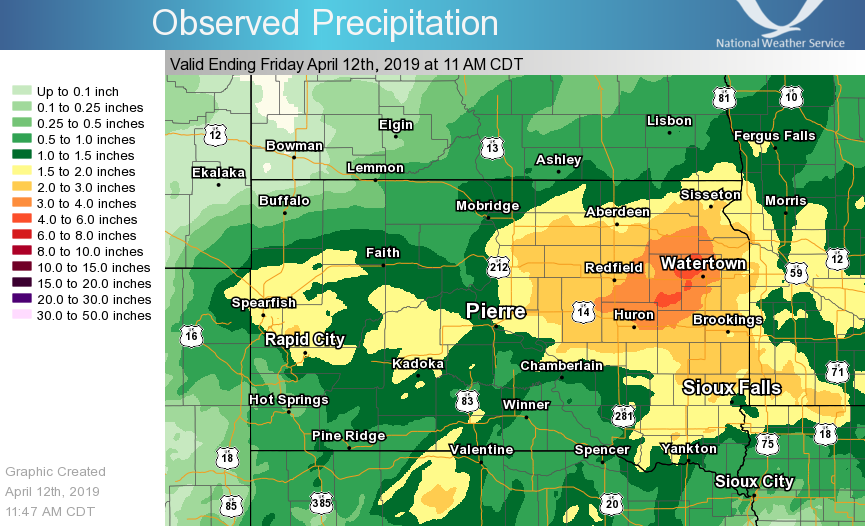 |
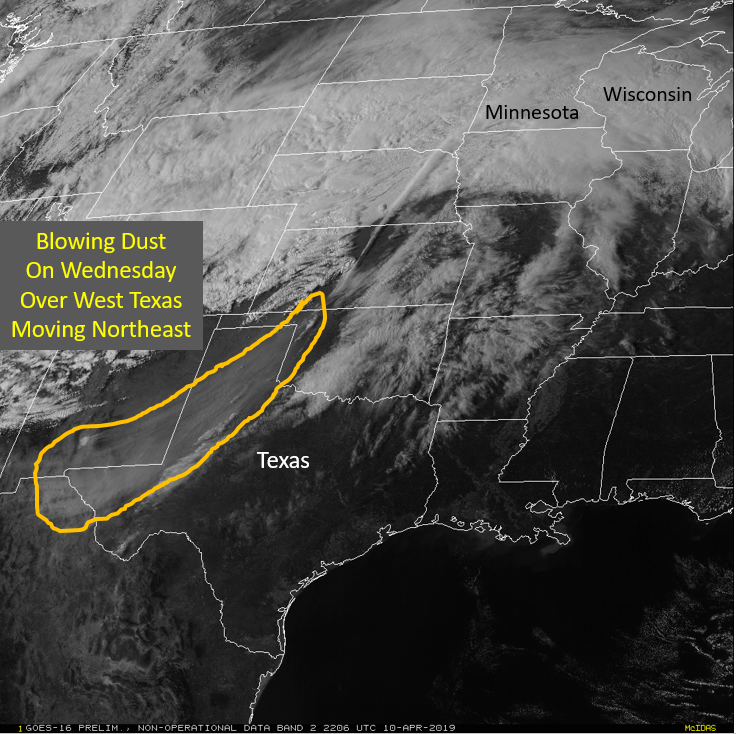 |
| Some of the highest reported snowfall amounts across west central Minnesota and central and northeastern South Dakota. | Snowfall reports in map format. This map is a mix of 24 hour, 48 hour, and 72 hour snowfall amounts. Thus, you will see variability from location to location. | Liquid Equivalent precipitation observed for the 72 hours prior to 11 AM CDT on April 12, 2019. River flooding remained a concern/threat in response. | Snowfall across portions of Minnesota turned an orange color, thanks to the mixing in of Texas/New Mexico dust. Visible Satellite image shown |
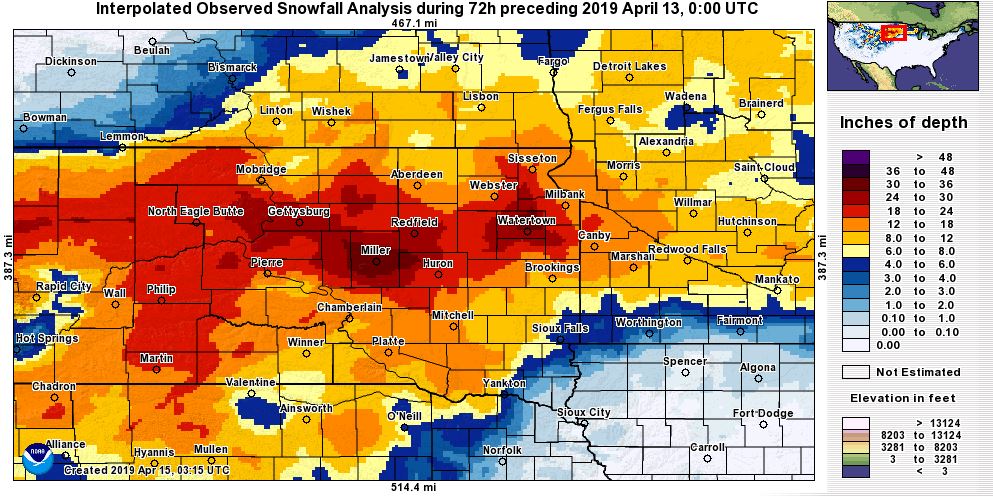 |
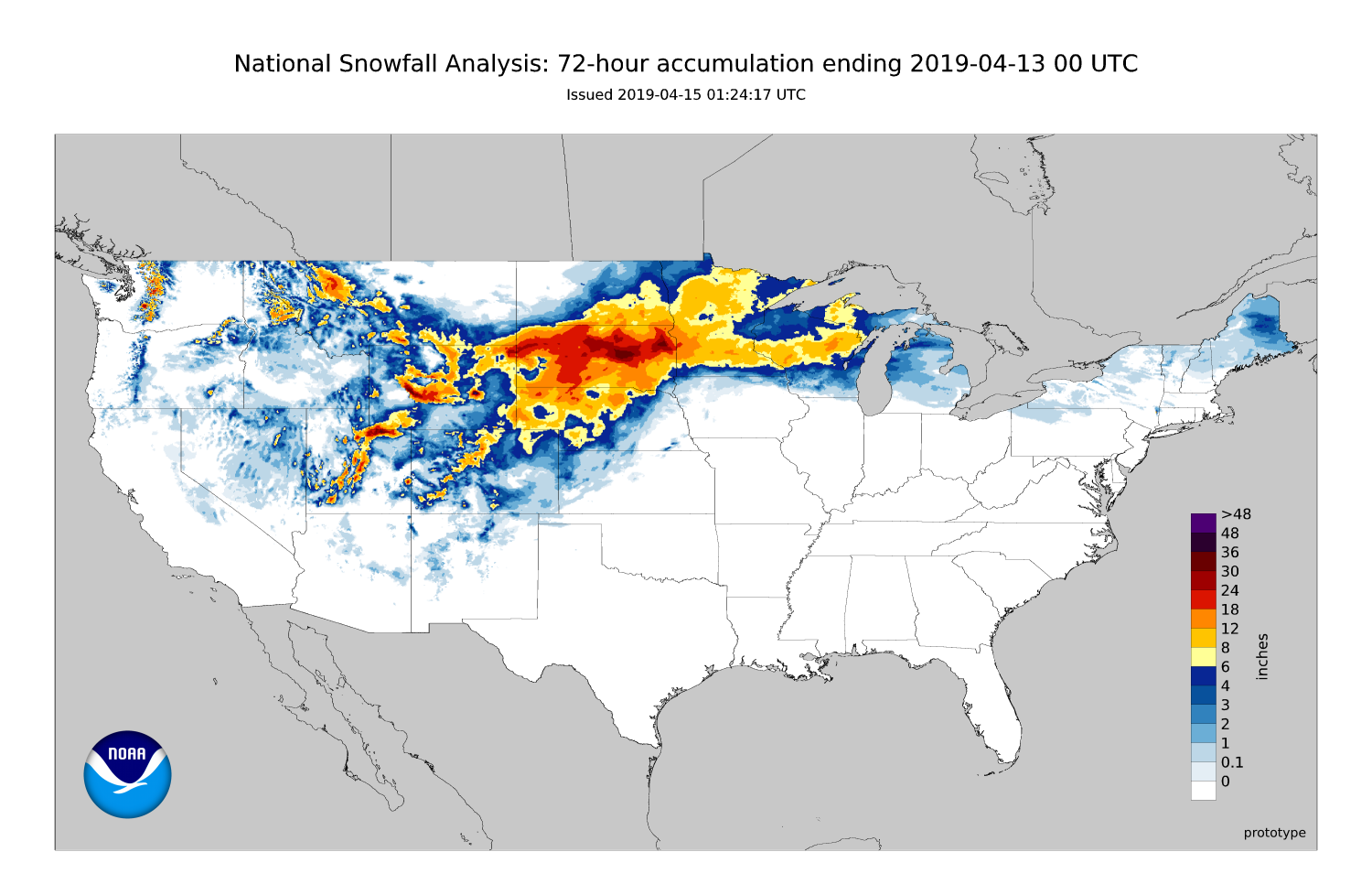 |
||
| Approximated snowfall totals across the area from April 10-12th, courtesy of NOHRSC | Approximated snowfall totals across the country from April 10-12th, courtesy of NOHRSC |
Snowfall reports below are as of 2 PM CDT April 12, 2019
...72 HOUR SNOWFALL REPORTS... Location Amount Time/Date Provider Clear Lake 26.3 in 1000 AM 04/12 COOP Watertown 1 W 25.0 in 0900 AM 04/12 COOP Roscoe 24.0 in 0700 AM 04/12 COOP Redfield 24.0 in 1250 PM 04/12 Emergency Mngr Hayti 1 W 22.3 in 0800 AM 04/12 COOP Castlewood 22.2 in 0200 PM 04/12 Public Lake Norden 22.0 in 0100 PM 04/12 Public Orient 21.0 in 1157 AM 04/12 Public Sisseton 3 W 18.5 in 0700 AM 04/12 UCOOP Hayes 6 E 18.5 in 0600 AM 04/12 UCOOP Browns Valley 6 N 18.1 in 0700 AM 04/12 COCORAHS Milbank 18.0 in 0730 AM 04/12 COOP Watertown 2 E 16.5 in 0915 AM 04/12 COCORAHS Faulkton 1 NW 16.0 in 0800 AM 04/12 COOP Pierre 1 S 14.1 in 0700 AM 04/12 COCORAHS Selby 14.0 in 0700 AM 04/12 COOP Presho 0.3 SSW 13.8 in 0700 AM 04/12 COCORAHS 3 ESE Aberdeen 13.5 in 0700 AM 04/12 Official NWS Obs Browns Valley 12.8 in 0600 AM 04/12 COOP Wheaton 12.3 in 0800 AM 04/12 COOP Aberdeen 1 SSW 12.0 in 0700 AM 04/12 COCORAHS Doland 11.3 in 0800 AM 04/12 UCOOP ...24 HOUR SNOWFALL REPORTS ENDING MORNING OF APRIL 12... Location Amount Time/Date Provider Garden City 4 S 20.0 in 0800 AM 04/12 UCOOP Murdo 14.3 in 0900 AM 04/12 COOP Sisseton 3 W 12.4 in 0700 AM 04/12 UCOOP Browns Valley 6 N 12.1 in 0700 AM 04/12 COCORAHS Webster 11.0 in 0800 AM 04/12 COOP Britton 10.5 in 0700 AM 04/12 COOP Ortonville 1 N 10.0 in 0800 AM 04/12 UCOOP Reliance 4 ENE 10.0 in 0800 AM 04/12 COCORAHS Roscoe 10.0 in 0700 AM 04/12 COOP Browns Valley 9.2 in 0600 AM 04/12 COOP Clear Lake 8.5 in 1000 AM 04/12 COOP Wheaton 8.0 in 0800 AM 04/12 COOP Milbank 8.0 in 0730 AM 04/12 COOP LaBolt 0.1 WSW 7.7 in 0730 AM 04/12 COCORAHS Watertown 1 W 7.5 in 0900 AM 04/12 COOP Hecla 7 WNW 7.5 in 0800 AM 04/12 COCORAHS Clear Lake 7 ESE 7.5 in 0800 AM 04/12 COCORAHS Aberdeen 1 SSW 7.0 in 0700 AM 04/12 COCORAHS Westport 2 Nw 7.0 in 0600 AM 04/12 COOP Aberdeen 3 E 6.3 in 0600 AM 04/12 COOP Presho 0.3 SSW 6.2 in 0700 AM 04/12 COCORAHS Claremont 2 SSE 6.0 in 0700 AM 04/12 COCORAHS Selby 5.4 in 0700 AM 04/12 COOP Faulkton 1 NW 5.0 in 0800 AM 04/12 COOP Hayes 6 E 5.0 in 0600 AM 04/12 UCOOP Pierre 1 S 4.5 in 0700 AM 04/12 COCORAHS Watertown 2 E 4.0 in 0915 AM 04/12 COCORAHS Herreid 3 ESE 3.0 in 0700 AM 04/12 COCORAHS Doland 1.5 in 0800 AM 04/12 UCOOP ...24 HOUR SNOWFALL REPORTS ENDING MORNING OF APRIL 11... Location Amount Time/Date Provider Watertown 1 W 15.7 in 0900 AM 04/11 COOP LaBolt 0.1 WSW 14.5 in 0800 AM 04/11 COCORAHS Clear Lake 13.5 in 1000 AM 04/11 COOP Vivian 7 NNE 13.0 in 1159 AM 04/11 COCORAHS Watertown 2 E 10.0 in 0845 AM 04/11 COCORAHS Hayti 1 W 10.0 in 0800 AM 04/11 COOP Clear Lake 7 ESE 9.6 in 0800 AM 04/11 COCORAHS Reliance 4 ENE 9.0 in 0800 AM 04/11 COCORAHS Miller 0.3 SSW 9.0 in 0750 AM 04/11 COCORAHS Roscoe 9.0 in 0700 AM 04/11 COOP Pierre 1 S 8.5 in 0700 AM 04/11 COCORAHS Hayes 6 E 8.0 in 0600 AM 04/11 UCOOP Doland 7.3 in 0800 AM 04/11 UCOOP Fort Pierre 0.5 SE 7.3 in 0700 AM 04/11 COCORAHS Aberdeen 3 E 7.2 in 0600 AM 04/11 COOP Webster 6.5 in 0800 AM 04/11 COOP Selby 5.1 in 0700 AM 04/11 COOP Faulkton 1 NW 5.0 in 0800 AM 04/11 COOP Aberdeen 1 SSW 5.0 in 0700 AM 04/11 COCORAHS Westport 2 Nw 5.0 in 0530 AM 04/11 COOP Wheaton 4.3 in 0800 AM 04/11 COOP Eureka 11 WSW 3.7 in 0700 AM 04/11 COCORAHS Browns Valley 3.6 in 0615 AM 04/11 COOP Claremont 2 SSE 3.5 in 0700 AM 04/11 COCORAHS Britton 2.5 in 0700 AM 04/11 COOP Hecla 7 WNW 2.0 in 0800 AM 04/11 COCORAHS Herreid 3 ESE 1.5 in 0700 AM 04/11 COCORAHS Eureka 1.2 in 0800 AM 04/11 COCORAHS ...MISC SNOWFALL REPORTS... Location Amount Time/Date Provider 3 NNW Norbeck 25.0 in 1200 PM 04/11 Public 5 W Mansfield 24.5 in 0903 AM 04/11 Public 4 S Garden City 20.0 in 0838 AM 04/12 CO-OP Observer Wallace 20.0 in 0130 PM 04/11 Public 3 S Clear Lake 18.0 in 0708 PM 04/11 Public Clark 18.0 in 1230 PM 04/11 Public Ortonville 17.0 in 0558 AM 04/12 Public Clear Lake 17.0 in 0708 PM 04/11 Public Hayti 16.5 in 0530 PM 04/11 Public Murdo 14.3 in 1001 AM 04/12 CO-OP Observer Ortonville 14.0 in 0141 PM 04/11 Public 3 W Sisseton 12.4 in 1006 AM 04/12 CO-OP Observer Clark 11.2 in 0958 AM 04/12 CO-OP Observer Webster 11.0 in 1008 AM 04/12 CO-OP Observer 4 N Victor 11.0 in 1007 AM 04/12 CO-OP Observer Britton 10.5 in 0955 AM 04/12 CO-OP Observer 1 N Ortonville 10.0 in 1003 AM 04/12 CO-OP Observer Castlewood 10.0 in 0959 AM 04/12 CO-OP Observer Roscoe 10.0 in 0901 AM 04/12 Emergency Mngr Mound City 10.0 in 0857 AM 04/12 Emergency Mngr Browns Valley 9.2 in 0957 AM 04/12 CO-OP Observer 1 N Ortonville 9.0 in 0617 PM 04/11 Cocorahs Clear Lake 8.5 in 1107 AM 04/12 CO-OP Observer Wheaton 8.0 in 1024 AM 04/12 CO-OP Observer Milbank 8.0 in 1001 AM 04/12 CO-OP Observer Watertown 7.5 in 1021 AM 04/12 CO-OP Observer 2 NW Westport 7.0 in 1009 AM 04/12 CO-OP Observer Pierre 7.0 in 1004 AM 04/12 CO-OP Observer Mound City 6.0 in 0846 AM 04/12 Trained Spotter Selby 5.4 in 1005 AM 04/12 CO-OP Observer Mobridge 4.0 in 1043 AM 04/12 CO-OP Observer Mound City 4.0 in 0251 PM 04/11 Public Observations are collected from a variety of sources with varying equipment and exposures. We thank all volunteer weather observers for their dedication. Not all data listed are considered official. $$
Storm Reports / Photos
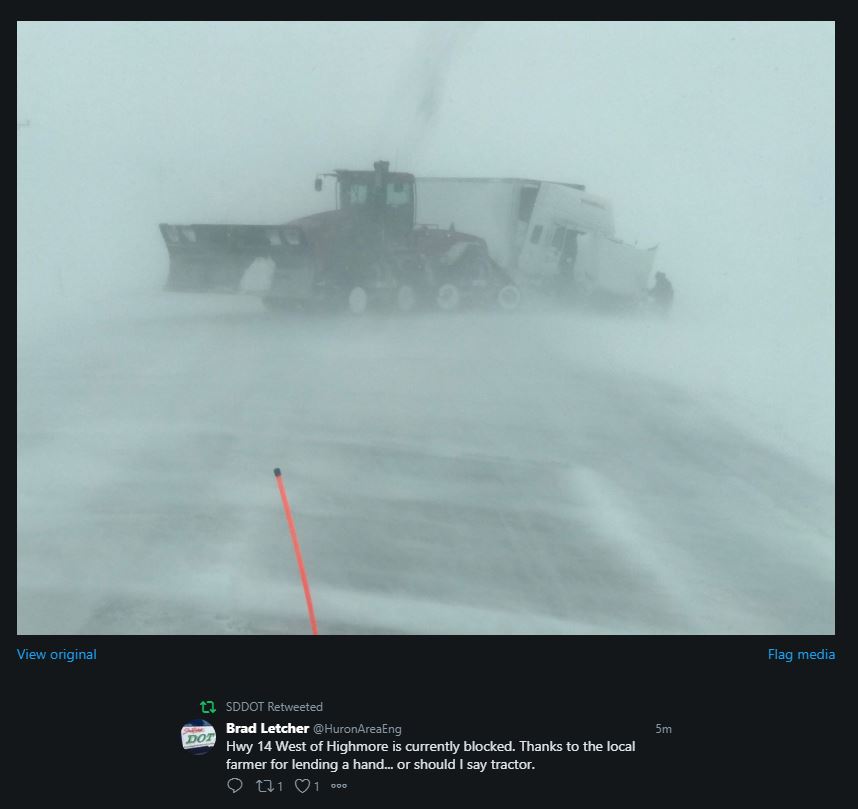 |
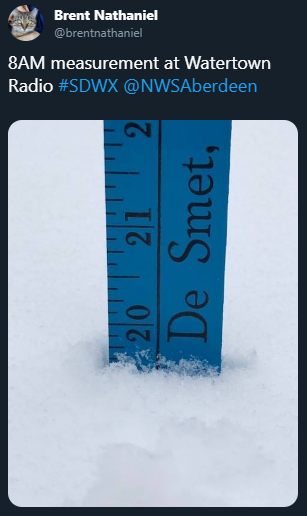 |
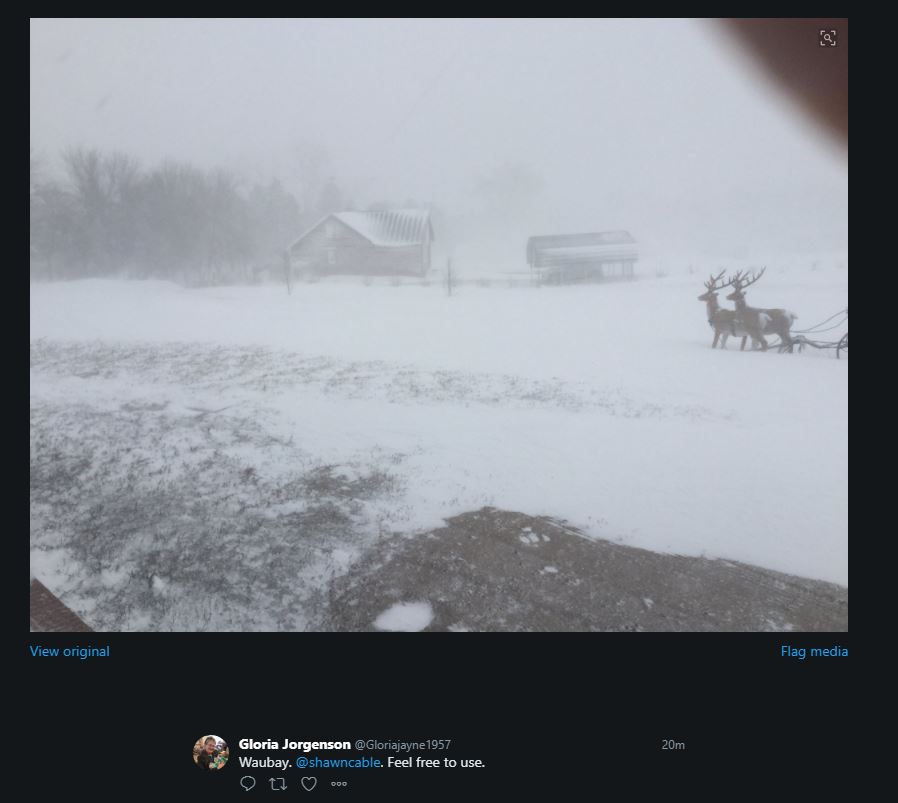 |
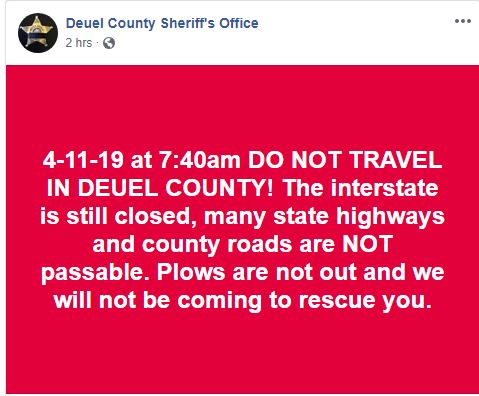 |
| Highway 14 west of Highmore (Source: SDDOT Twitter) | Snowfall measurement in Watertown at 8 AM April 12, 2019 (Source: Brent Nathaniel - Twitter) | Reduced visibility in Waubay at 830 AM CDT April 11, 2019 (Source: Gloria Jorgenson - Twitter) | Highway 14 west of Highmore (Source: SDDOT Twitter) |
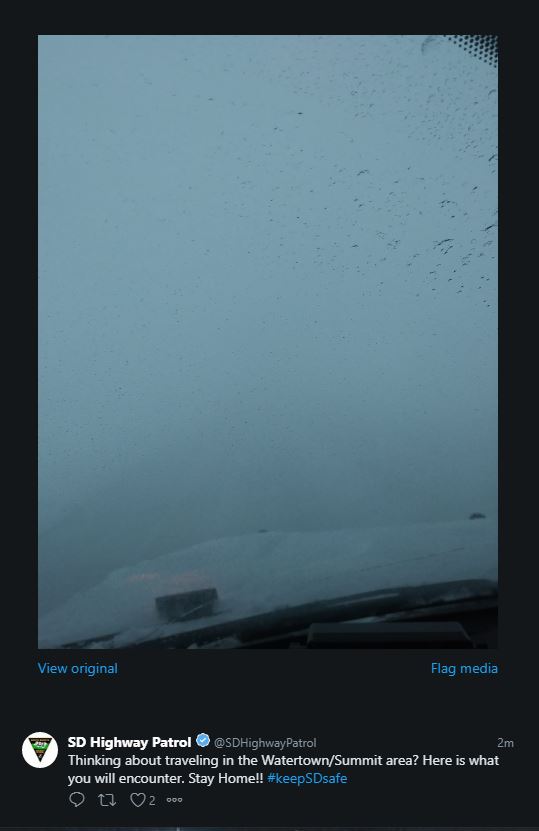 |
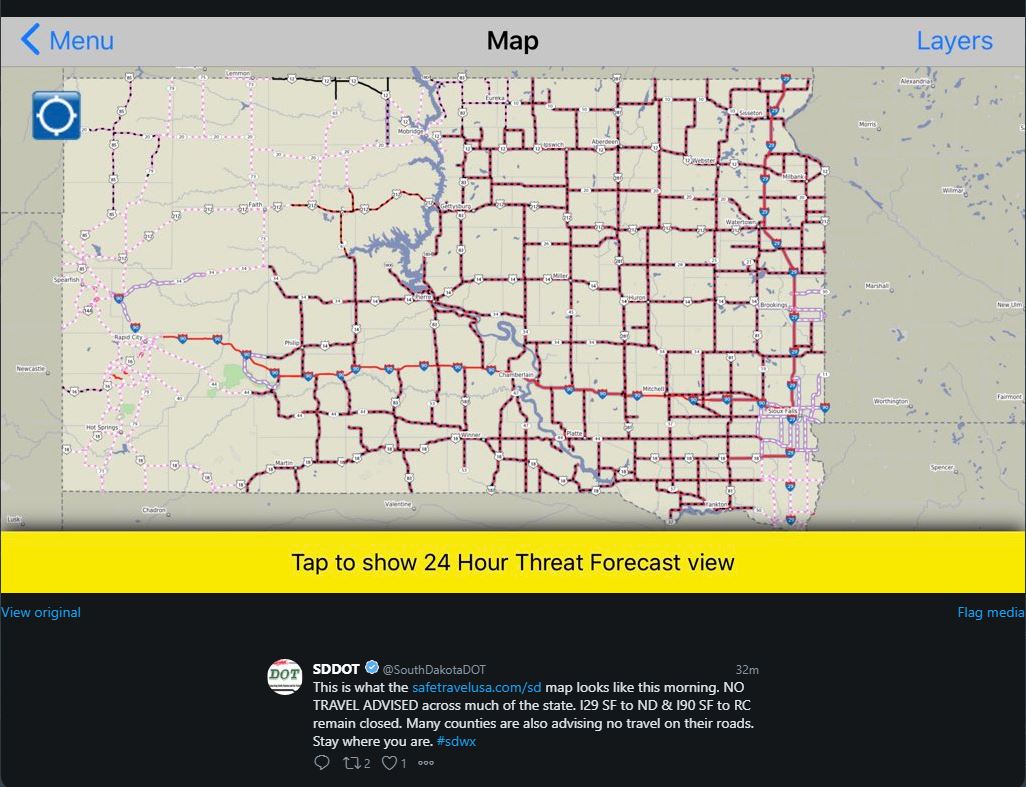 |
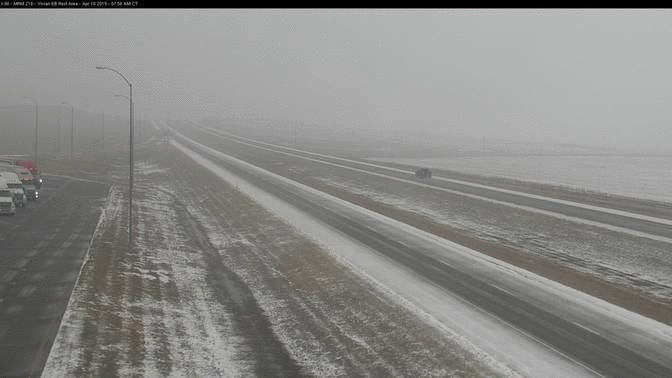 |
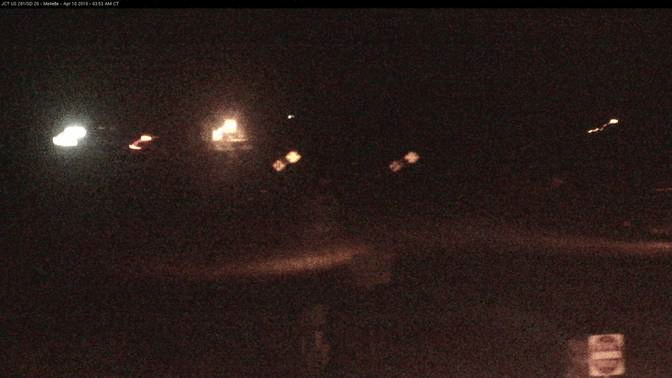 |
| Zero visibility in the Watertown/Summit area at 830 AM CDT April 11, 2019 (Source: SD Highway Patrol - Twitter) | No Travel Advised covered most of the eastern 2/3rds of South Dakota at 7 AM CDT on April 11, 2019 (Source: SDDOT Twitter) | Webcam Loop at Vivian, SD - From 8 AM April 10 to 8 AM April 12 (Source: SDDOT) | Webcam Loop at Mellette, SD - From 4 AM April 10 to 8 AM April 12 (Source: SDDOT) |
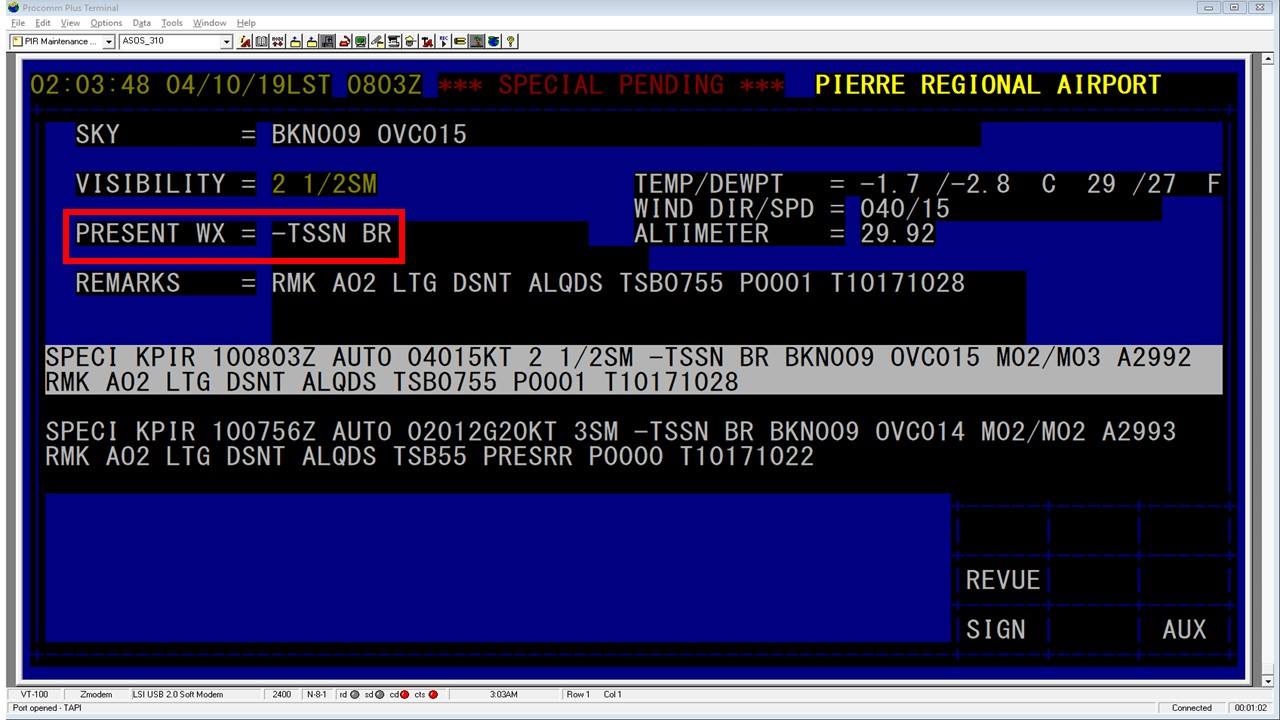 |
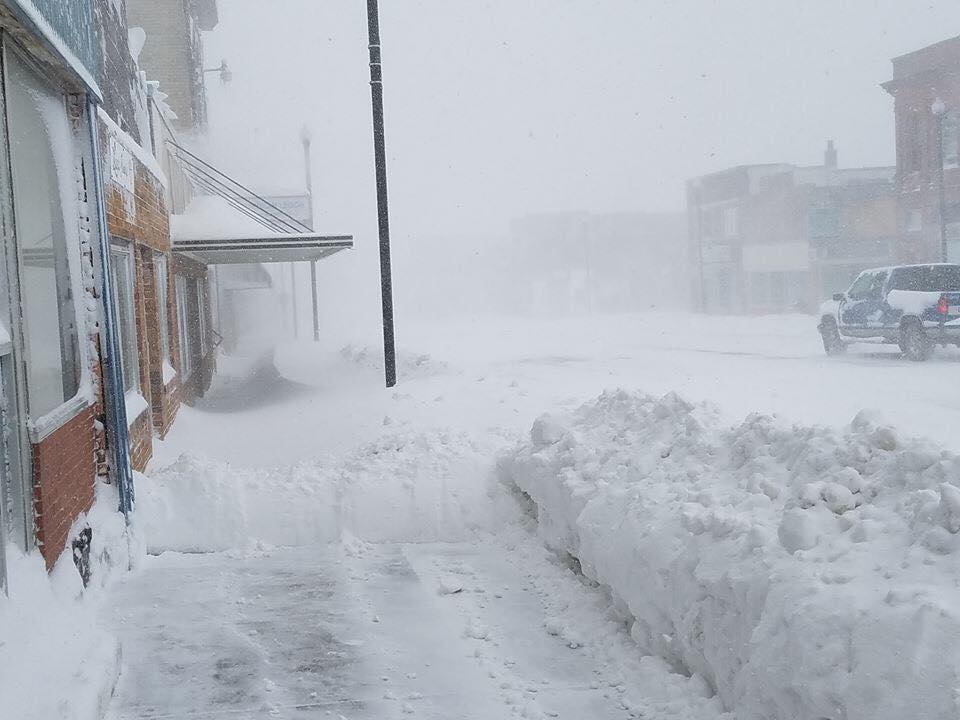 |
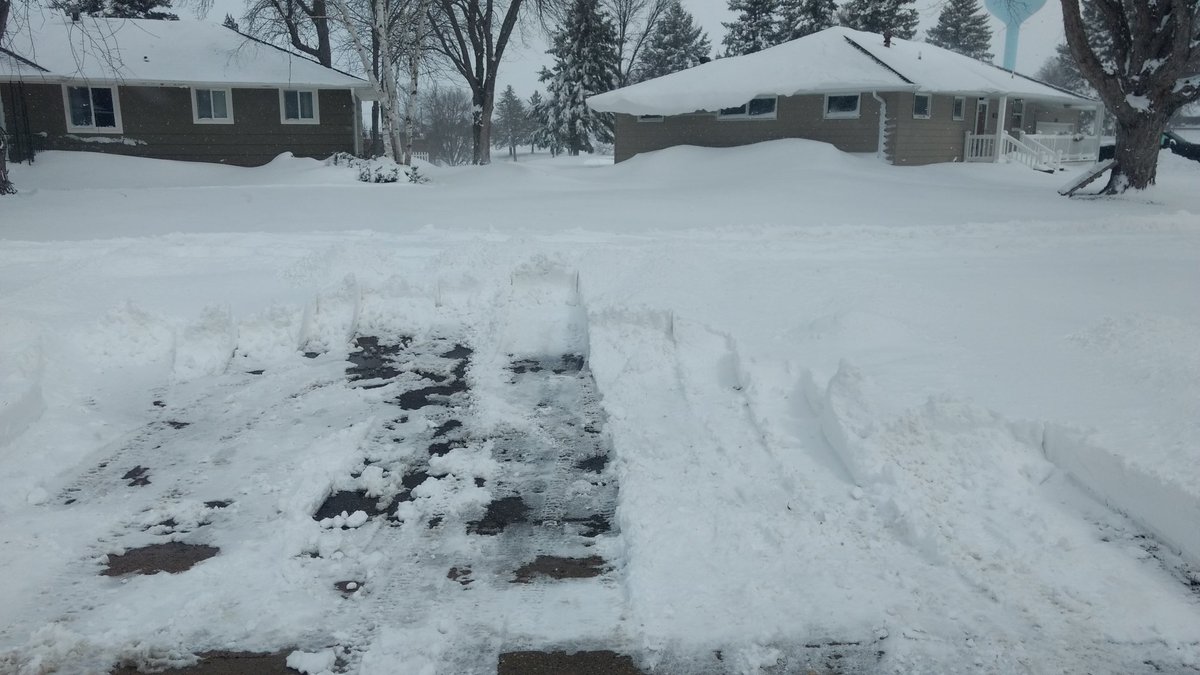 |
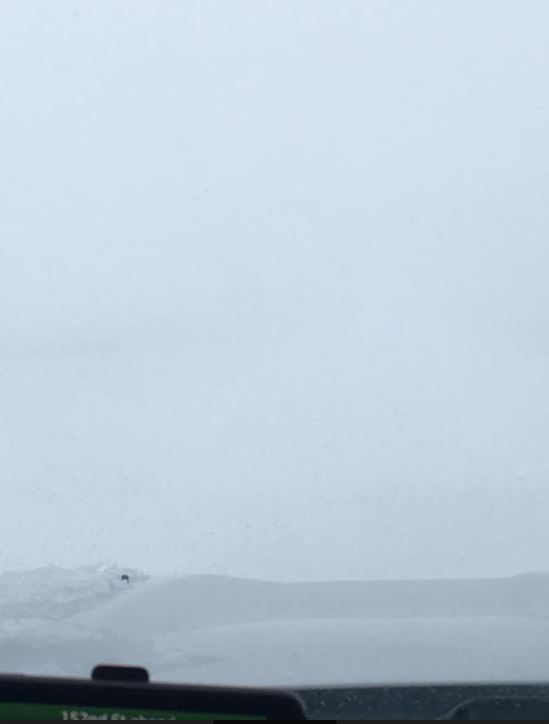 |
| Thundersnow reported at Pierre on the morning of April 10th | Webster at 1130am on the 11th, courtesy of Daniel Basler Jr. Keep in mind, many areas began the event with little to no snow depth. | Heavy snow accumulations at Watertown, courtesy of Alex Resel | Blizzard with an estimated 10 foot visibility 2 miles north of Mellette at 7:50 am on the 11th, courtesy of the SD Highway Patrol |
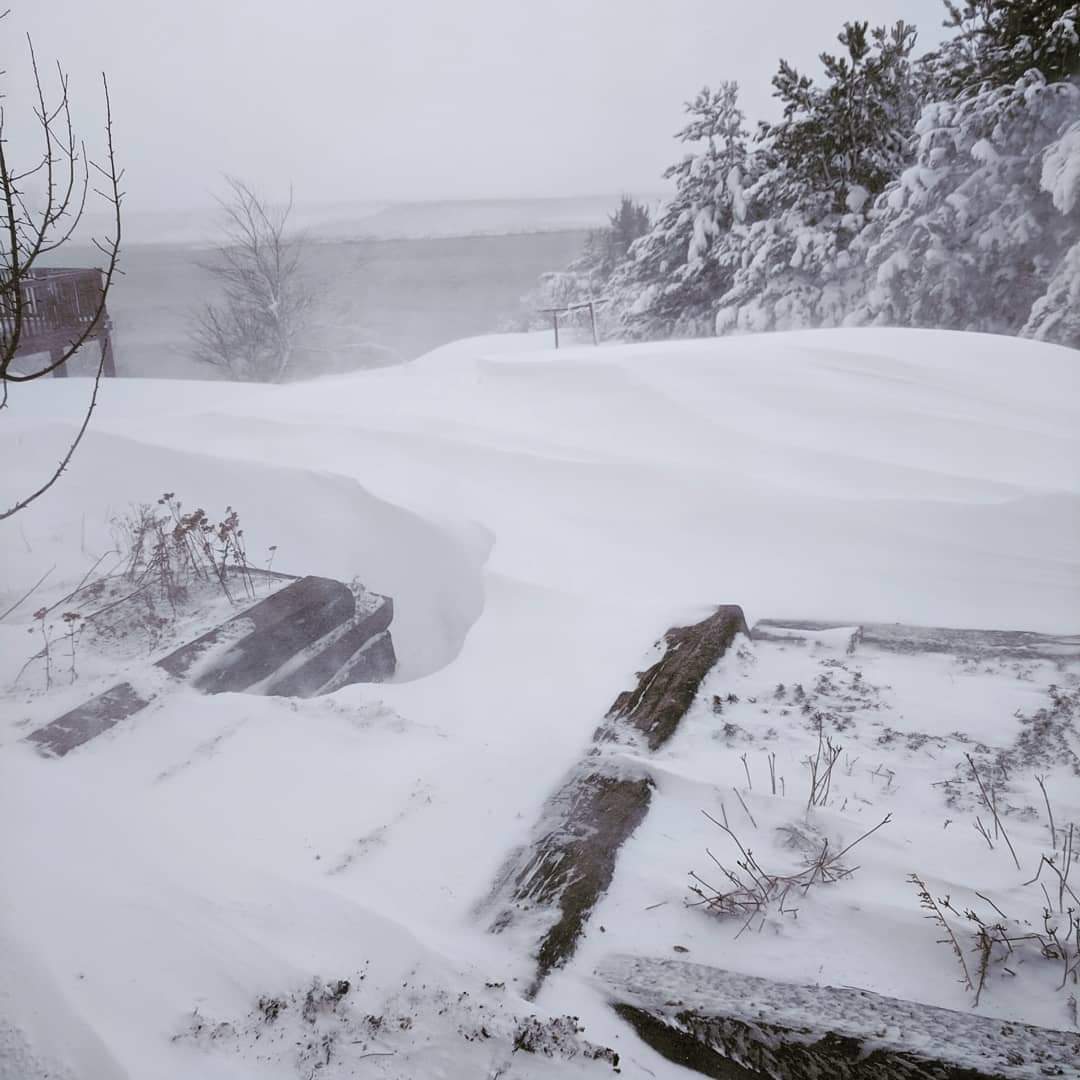 |
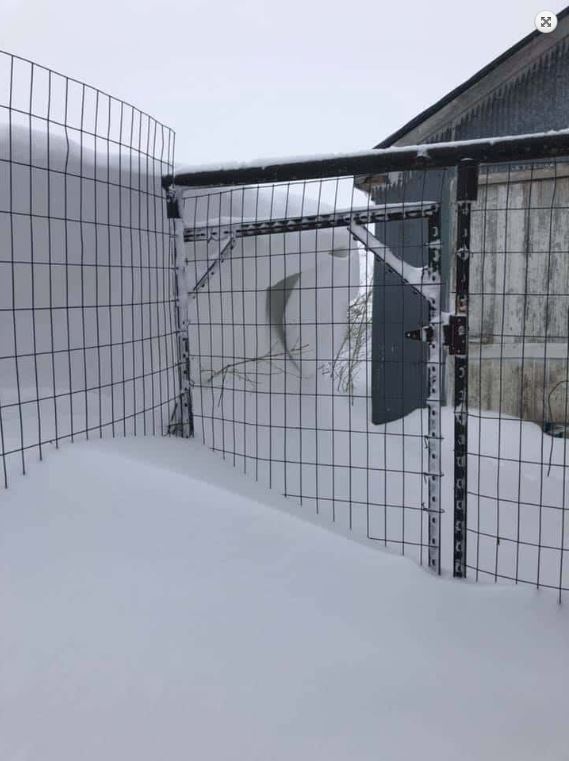 |
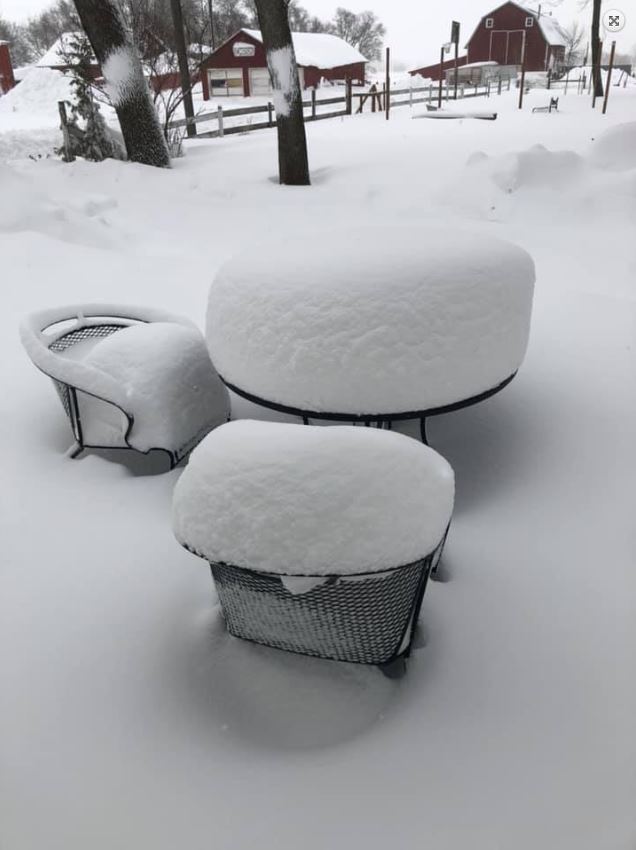 |
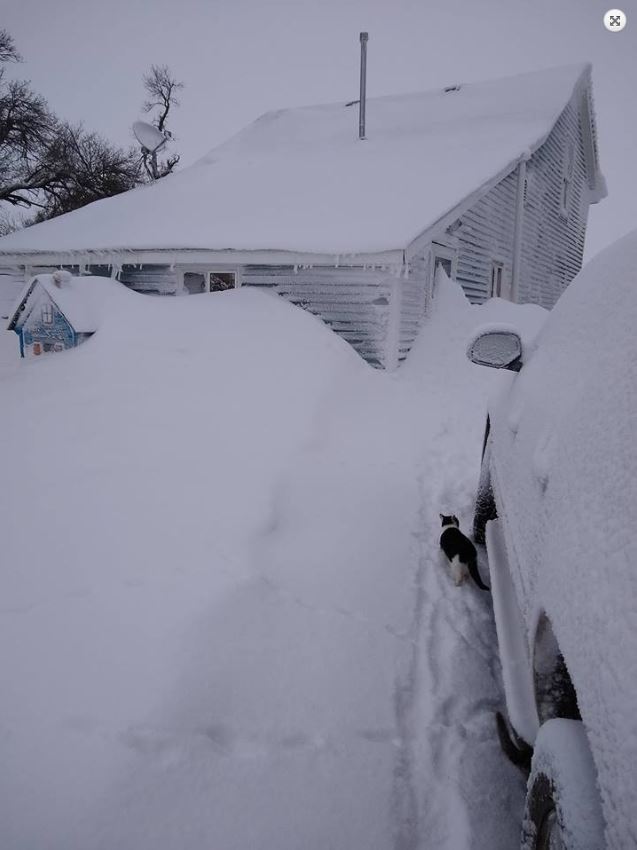 |
| Blizzard conditions and heavy snow at Richmond Lake, from an NWS employee | The following photos, including this one by Ty Fuller from Henry, are relayed by Brent Nathaniel via www.gowatertown.net/wpb_gallery/photos-april-2019-blizzard/#prettyPhoto | Clark, courtesy of Rae Jean Flora | Goodwin, courtesy of Daisy Muston Van Wormer |
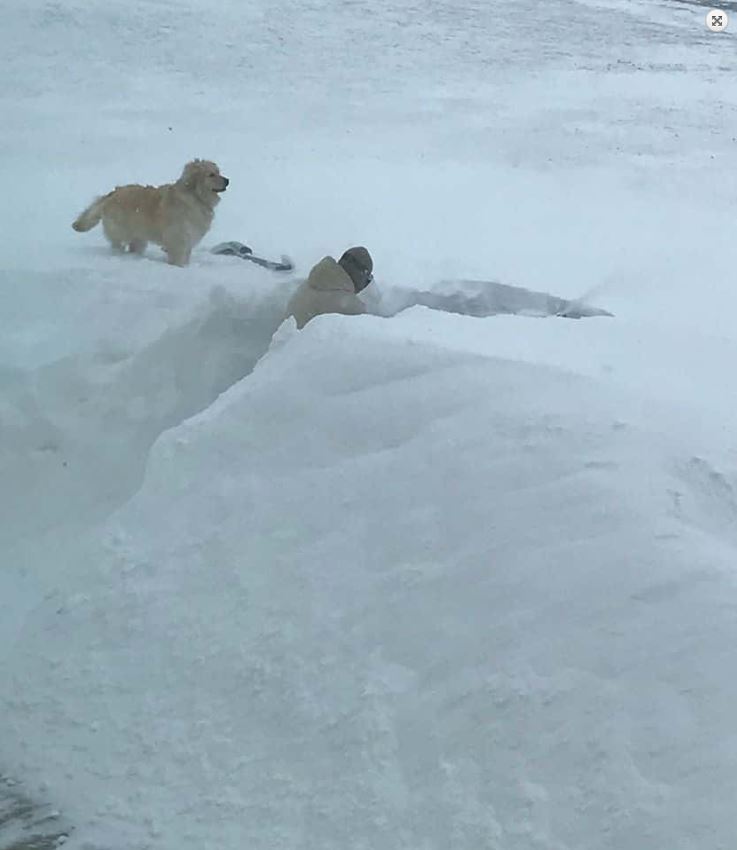 |
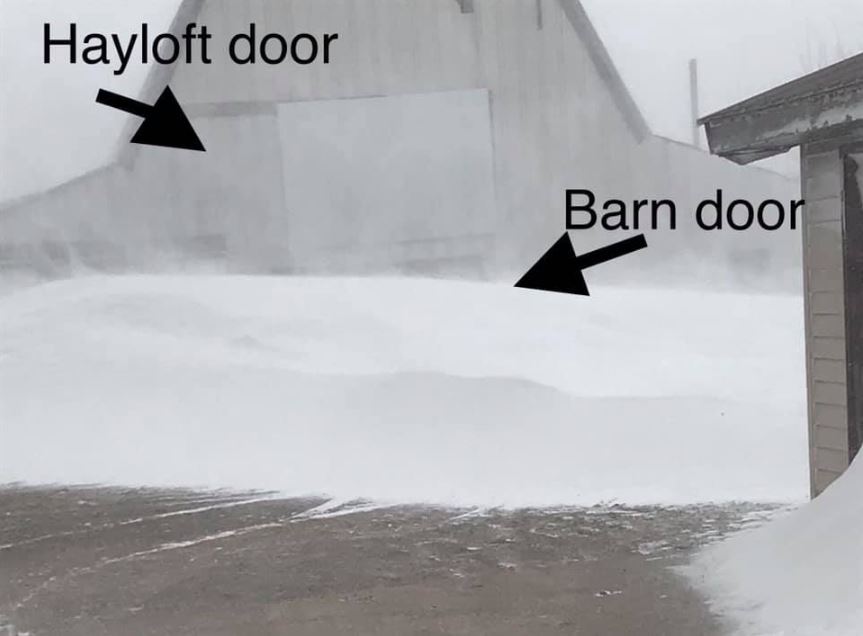 |
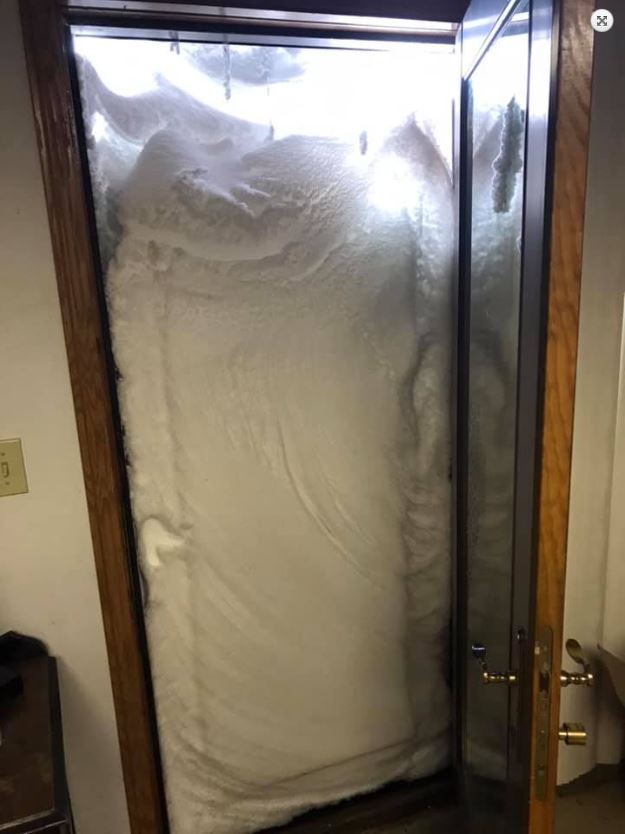 |
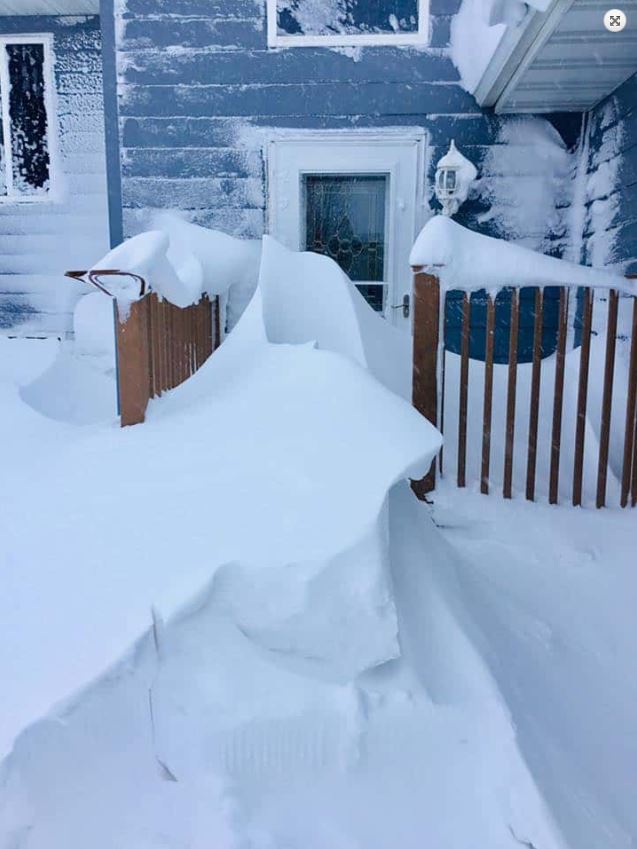 |
| Clear Lake, courtesy of Angela Carr Imm | Lake City, courtesy of Tari Heitmann | Lake City, courtesy of Tari Heitmann | Watertown, courtesy of Melissa Passow |
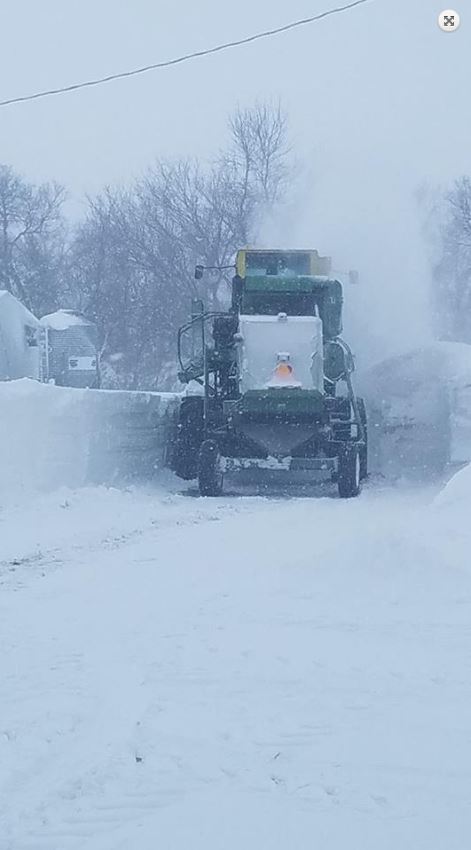 |
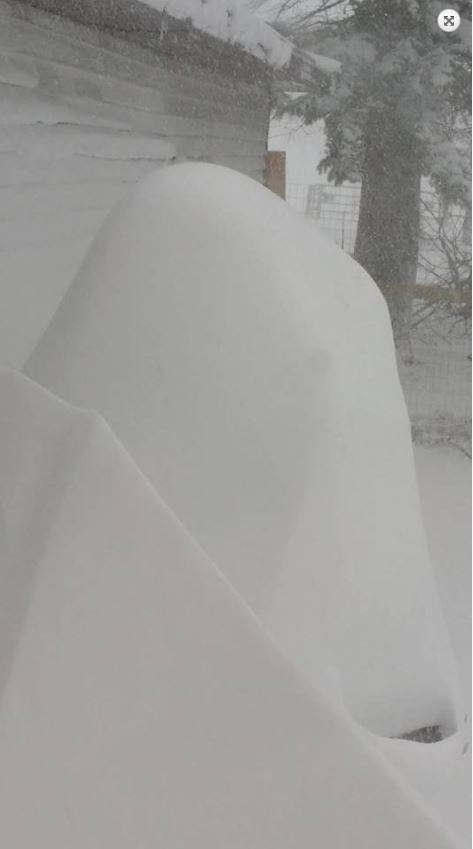 |
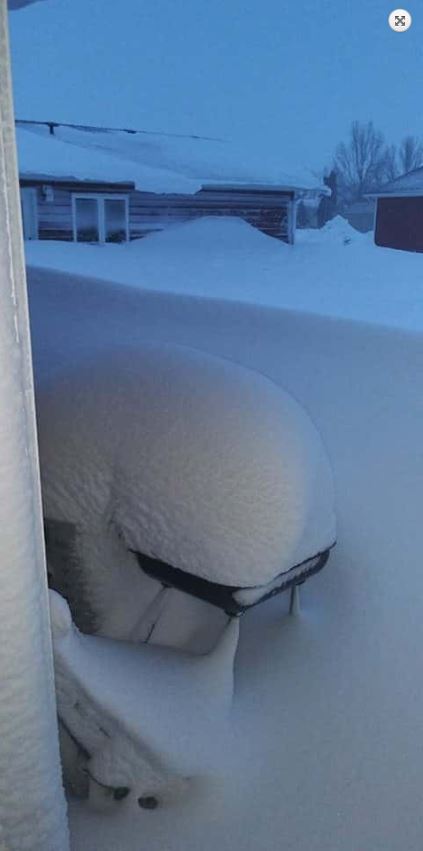 |
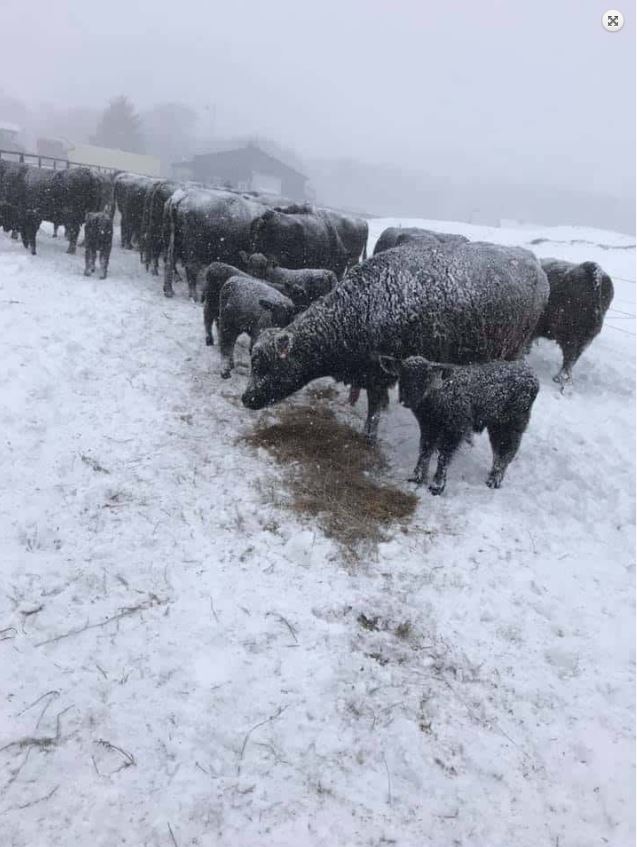 |
| Clear Lake, courtesy of Lisa Brown | Henry, courtesy of Lacy Jordan Shepherd | Ipswich, courtesy of Karen Casare | Willow Lake, courtesy of Carolyn Edleman |
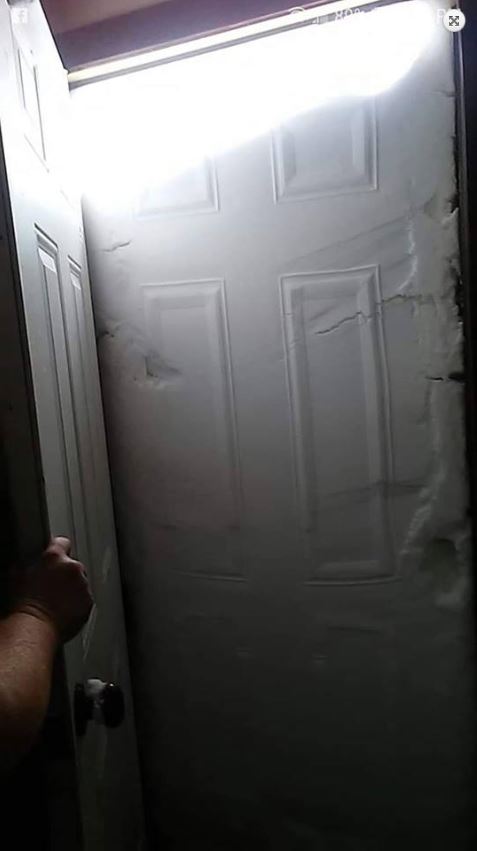 |
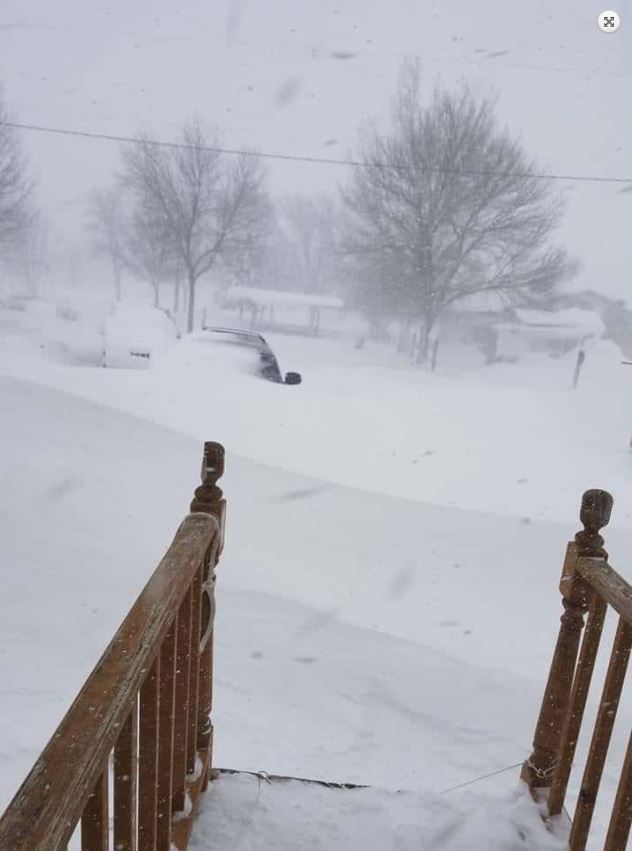 |
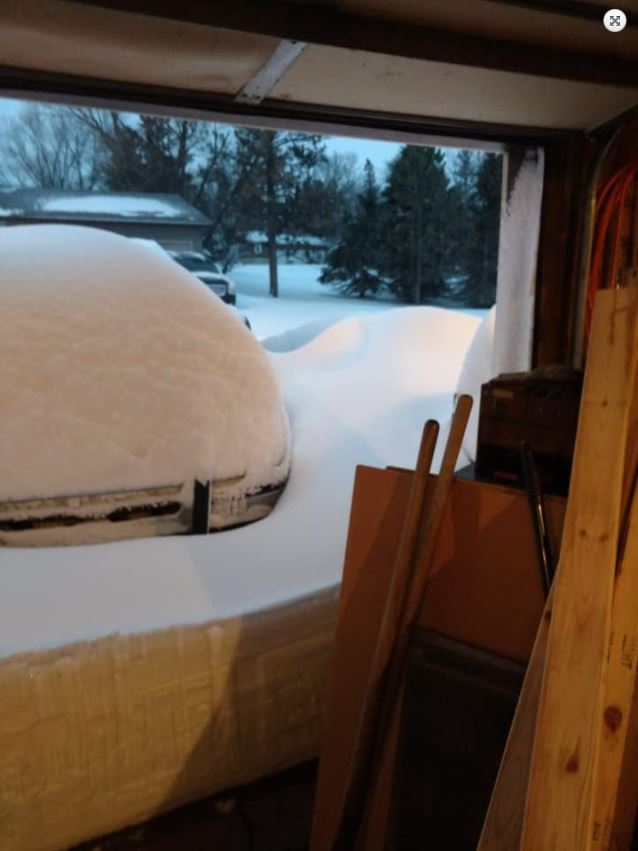 |
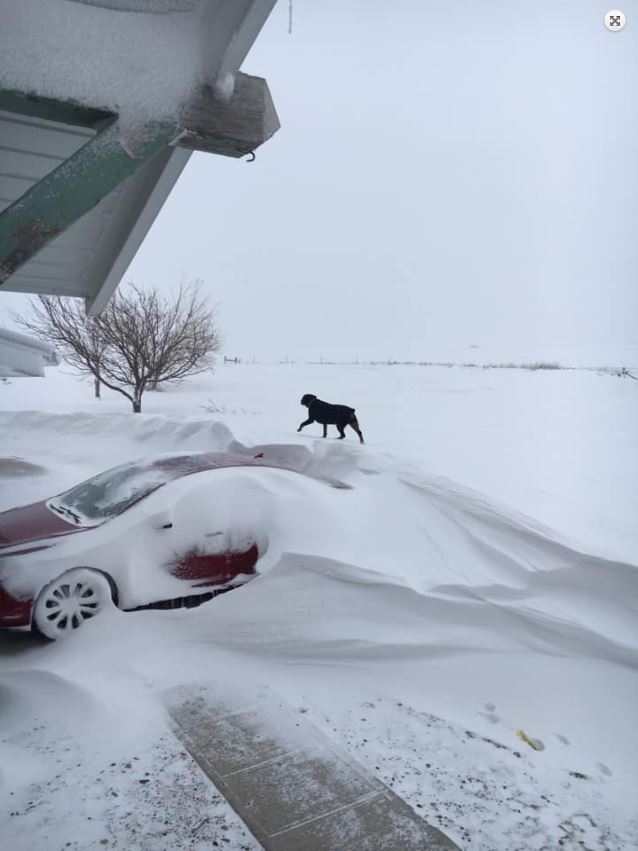 |
| Summit, courtesy of Jon Boomgaarden | Mellette, courtesy of Garret Barnhardt | Lake Kampeska, courtesy of Debie Hamers Grupe | South Shore, courtesy of Daniel Kaaz |
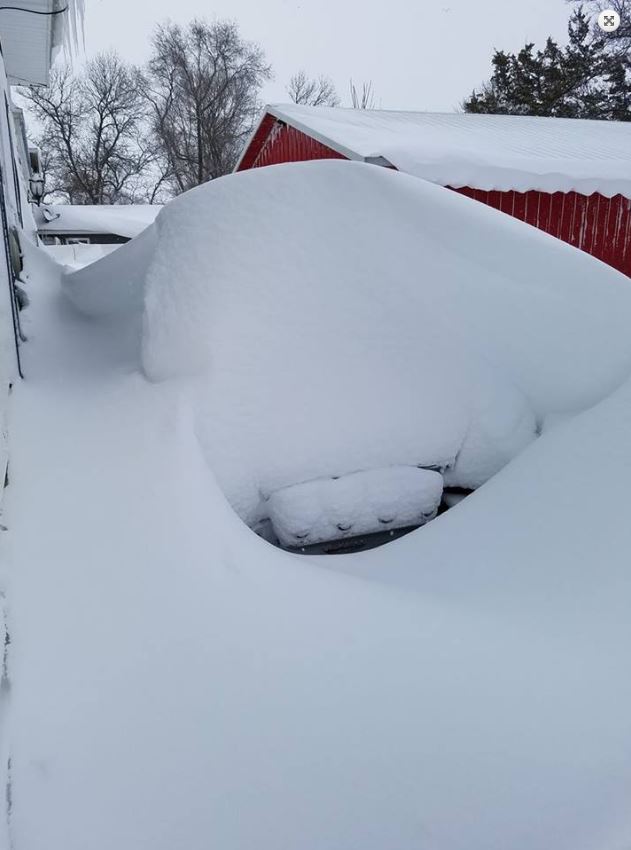 |
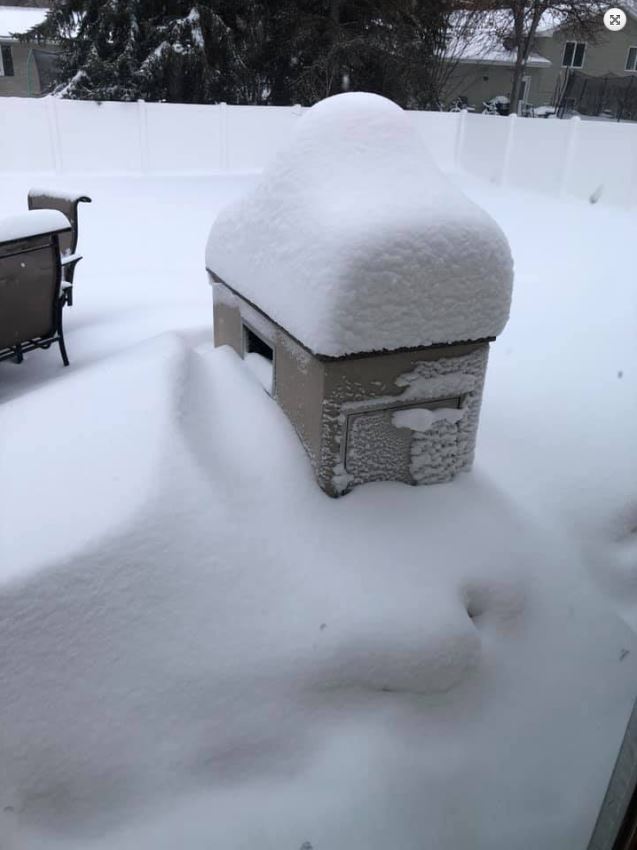 |
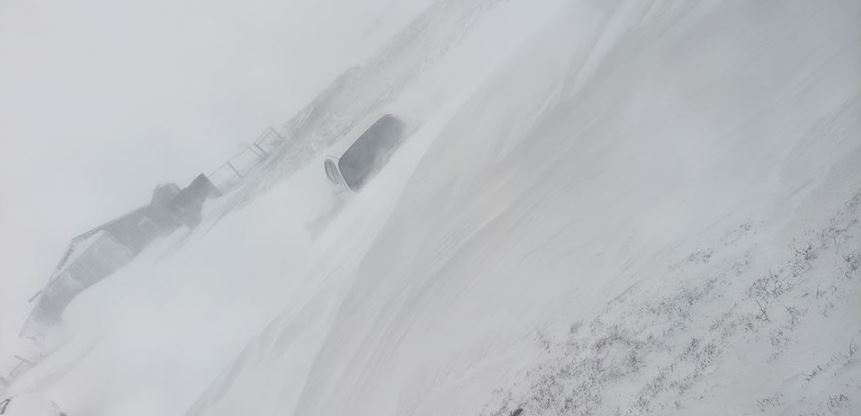 |
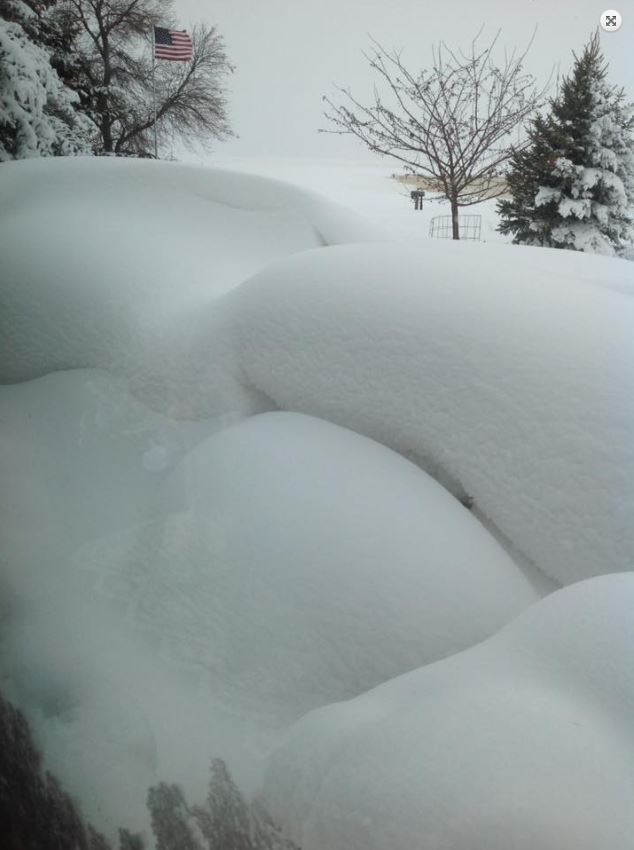 |
| Bradley, courtesy of Cindy Bruns | Aberdeen, courtesy of Chris Mueller | Waubay, courtesy of Ruth Holzerland | Northville, courtesy of Rose Hoellein |
Records
Here are some preliminary records for this event.
Daily Snowfall/Precipitation:
Aberdeen AP: 6.1" of snow on the 10th (4.5" in 2007)
Pierre AP: 5.1" of snow on the 10th (4.7" in 2013) and 10.2" of snow on the 11th (4.7" in 1995)
Mobridge AP: 0.79" of liquid on the 10th (0.79" in 1959) and 3.0" of snow on the 10th (2.2" in 1959)
Watertown AP: 10.2" of snow on the 10th (10.0" in 2008) and 13.0" of snow on the 11th (7.3" in 2013)
Sisseton AP: 11.3" of snow on the 11th (6.1" in 2003)
Other:
Watertown AP 25” = Highest 3-day total (records through 1893)
Sisseton AP 18.6” = Highest April 3-day total (records through 1900)
Clear Lake 26.3” = Highest 3-day total (records through 1903)
Castlewood 23.3" = Highest 3-day total at least from 1893-2011
Clark 28.9" = Highest 3-day total (records through 1894)
Ipswich 25" = Highest 3-day total (records through 1894)
Roscoe 24.8” = Highest 3-day total (records through 1934)
Milbank 18" = Highest 3-day April total at least from 1893-2009
Waubay 2NW 18" = Tied highest 3-day total (records through 1952)
Webster 17.5" = Highest 3-day April total (records through 1893)
Pierre AP 16.1” = 2nd highest April 3-day total
Aberdeen AP 13.6” = 4th highest April 3-day total (records through 1893)
Selby 14" = Highest 3-day April total (records through 1907)
Wheaton 12.5” = Highest April 3-day total (records through 1914)
This storm will go down as one of the worst to affect the area in recent history, and in some cases all-time, in terms of snowfall totals. For comparison, official 3-day snowfall records by county across South Dakota and Minnesota can be found here (these records are composed of official COOP measurements): https://www.ncdc.noaa.gov/snow-and-ice/snowfall-extremes/SD/3
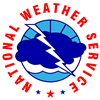 |
Media use of NWS Web News Stories is encouraged! Please acknowledge the NWS as the source of any news information accessed from this site. |
 |